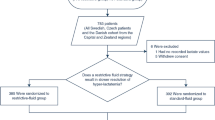Abstract
Objective
To analyze the factors responsible for failure of fluid supplementation in full-term neonates with severe non-hemolytic hyperbilirubinemia.
Methods
The data from two previous randomized controlled trials was used in this study. Full-term (≥37 wks) neonates with severe hyperbilirubinemia (serum total bilirubin 18–25 mg/dL), who received intravenous fluid supplementation in addition to phototherapy were included. Intravenous fluid supplementation was given for 8 h. Those neonates, whose serum bilirubin levels increased by 2 mg/dL or crossed 22 mg/dL, underwent exchange transfusion. The authors compared baseline serum bilirubin, sodium, and osmolality and their changes during study period in neonates who required exchange transfusion (Non-responders) with those who didn’t (Responders).
Results
The data of 121 neonates was analyzed (non-responders = 17, responders = 104). Both the groups had similar weight loss since birth, baseline serum sodium and osmolality. Mean baseline serum bilirubin [22.5 (1.7) vs 21.6 (1.6) mg/dL, p = 0.04] and cesarean/ instrumental delivery (27.6% vs 20.2%, p = 0.02) were significantly higher in non-responders. With fluid supplementation, serum sodium and osmolality changed similarly in both the groups over 8 h. On multiple regression analysis, only cesarean/instrumental delivery [OR 3.9 (95% CI–1.2, 13.4)] retained independent significance.
Conclusions
Fluid supplementation for severe non-hemolytic hyperbilirubinemia is less likely to be successful in neonates born by cesarean/instrumental delivery as compared to normal vaginal delivery.
Similar content being viewed by others
References
Sgro M, Campbell D, Shah V. Incidence and causes of severe neonatal hyperbilirubinemia in Canada. CMAJ. 2006;175:587–90.
Narang A, Gathwala G, Kumar P. Neonatal jaundice. An analysis of 551 cases. Indian Pediatr. 1997;34:429–32.
Gonzalez de Dios J, Moya Benavent M, Sirvent Mayor MC, Dura Trave T. Seasonal variation in neonatal jaundice. An Esp Pediatr. 1996;45:403–8.
Milby TH, Mitchel JE, Freeman TS. Seasonal neonatal hyperbilirubinemia. Pediatrics. 1969;43:601–5.
Mehta S, Kumar P, Narang A. A randomized controlled trial of fluid supplementation in term neonates with severe hyperbilirubinemia. J Pediatr. 2005;147:781–5.
American Academy of Pediatrics Subcommittee on Hyperbilirubinemia Management of hyperbilirubinemia in the newborn infant 35 or more weeks of gestation. Pediatrics 2004;114:297–316.
Boo NY, Lee HT. Randomized controlled trial of oral versus intravenous fluid supplementation on serum bilirubin level during phototherapy of term infants with severe hyperbilirubinaemia. J Paediatr Child Health. 2002;38:151–5.
Balasubramanian K, Kumar P, Dutta S, Attri SV. Isotonic verses hypotonic fluid supplementation in term neonates with severe hyperbilirubinemia—a randomized controlled trial. Proceedings of the XXVIII Annual convention of National Neonatology Forum; 2008 Dec 11–14; Kolkata, India.
Buchan PC. Pathogenesis of neonatal hyper-bilirubinemia after induction of labor with oxytocin. Br Med J. 1979;2:1255–7.
Contributions
SSS; Extracted analyzed and summarized the data, did analysis, wrote the initial draft, PK; Conceived the idea, planned the study, reviewed the analysis, revised it critically for important intellectual content, final approval of the manuscript,KB; Recruited subjects and collected data in one trial, SM; Recruited subjects and collected data in second trial.
Conflict of Interest
None.
Role of Funding Source
None.
Author information
Authors and Affiliations
Corresponding author
Rights and permissions
About this article
Cite this article
Saini, S.S., Kumar, P., Balasubramanium, K. et al. Fluid Supplementation in Hyperbilirubinemia. Indian J Pediatr 78, 1096–1099 (2011). https://doi.org/10.1007/s12098-011-0394-0
Received:
Accepted:
Published:
Issue Date:
DOI: https://doi.org/10.1007/s12098-011-0394-0




